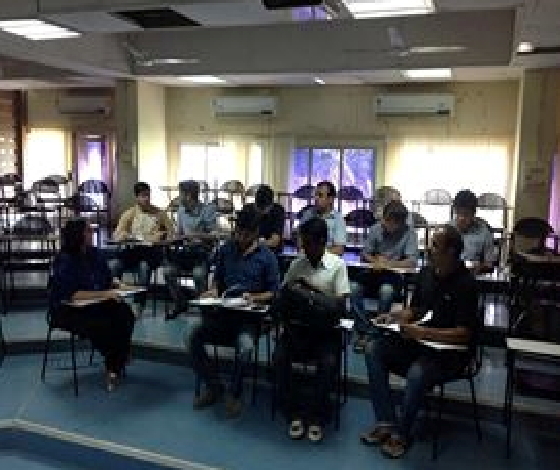Invitation for Stress Management for MBA Students of NITIE:
I was approached by final year students from a renowned MBA college in Mumbai, Nitie to conduct a short 1.5 hour session on stress management before their placements. Stress being a vast topic, to cover it in one session was next to impossible. So I thought it best to narrow it down to what exactly in the given situation they perceive as stressful. As we all know any situation is experienced stressful if we do not have adequate coping mechanisms to deal with it
Feed Back sheet prior to the session to assess stress inducing factors:
Given the short notice, I felt that the best way to begin with was to seek feedback on stressed the students the most. So a short questionnaire, in the form of a checklist, about issues that they perceive as being stressful was sent across to the students. The results of this questionnaire were collated and we decided to tackle the top two which were haunting the MBA aspirants viz
- Mismatch between the aspirations and job profile
Pre session discussion on issues surrounding placement:
On the day that we conducted the session what I discovered while chatting up the students (prior to the session) was that the general environment surrounding the job market was extremely grim.
- Fewer companies were coming to campus for recruitments
- Pay packages were being revised downwards
- Students were disenchanted with the job profiles being offered
- What’s more, a sizeable proportion of the students had left high paying jobs to pursue the full time MBA course with the expectation that an MBA would fast track their careers.
This disillusionment coupled with the sour economic scenario led to additional burden from
- the finance strain from educational loans and high course fees
- time investment in the 2 year MBA, and
- social and peer pressure from
- not getting the right job profile,
- insignificant jump in salary or having to work for equal pay or less than their previous job
Apprehensions about future prospects a reality or mental fabrication?
Their fears were real and not a fabrication. So given the limited time at my disposal I thought the best was to work on the top two identified factors. I decided that the best course of action to relieve their stress was to
Sessions activities and the logic behind it?
- Work on their self-trust to counter the negative thoughts, and
- Through an exercise that would make them self-aware of their leadership qualities and hence better their chances at the personal interview and group discussion stages undertaken during campus recruitments.
Both these issues were dealt with through activities using group dynamics (group of 9-10 students) to maximize learning and sharing during the session.
Activity 1:
The first activity catered to rediscovering their inner strength and the positivity arising from self-trust in times of stress and difficulty (after all, self-help is the best help) and the second activity was a role play which would bring to the fore their leadership skills which were then analyzed.
In the first activity the group was blindfolded and they were asked to perform certain tasks using only their feelings as a barometer to achieve success. At the end of the activity the group was pleasantly surprised that just on the basis of their feelings and relying on themselves they knew exactly what to do and do it well.
Second Activity:
The second activity was a role play where the group had to make decisions on which member should be allowed to stay on board and who should leave. The purpose of the activity was to identify one’s personal strengths and weakness using group dynamics. The second activity highlighted the strengths and weaknesses of each individual in his / her interaction with the other. This would then give them the ability to choose any action irrespective of the given emotion.
During times of stress it is safer and more reliable to draw on your strengths rather than spending energy trying to control the environment or worry about future. The later draws you into the spiral of negative thoughts, reactive behaviour and drains you out of any possibilities, whereas the earlier option will help you to remain calm, composed and in a free mental space to be able to accurately evaluate and choose your action steps. This freedom to be able to choose any action without spending energy to change the emotions or outcomes helps people to stay focused on the given task (placements in this case) without getting stuck in future anxieties (job profile or financial logistics) is the power of self-awareness.
Key to success lies in self-awareness:
This kind of insight and awareness oriented work is possible only with psychotherapeutic understanding and by and large remains untouched during soft skills taken up by most colleges and corporates. Insight oriented awareness when worked along with soft skills has proven to be more effective in bringing about positive results during interviews.
Empirical evidence on first impressions being a primary factor driving to choosing a candidate for the job:
A lot of research has been conducted on what is the basis of choosing a particular candidate. What strikingly comes across is that most of these decisions are based on first impressions rather than logical evaluation of the individual. Though it may seem unfair for a hiring manager to make a character judgment within the first seconds of meeting a candidate, record-breaking application volumes in the job market right now mean that hiring agencies don’t have the time or resources to move forward with job prospects that don’t impress them out of the gate.
In order for candidates to best prepare themselves for such a high-pressure situation, it is valuable to understand the psychology behind first impressions, how that opinion is generated and how it can be used for strategic advantage. These researches served as the basis of our first activity. Given below are some of the links to some researches on first impressions:
http://www.apa.org/gradpsych/2012/11/first-impressions.aspx
http://psychcentral.com/news/2009/03/09/brain-response-to-first-impressions
http://www.utexas.edu/news/2009/11/03/impressions_personality/
http://www.futurity.org/first-impressions-sometimes-say-it-all/
http://www.sciencedaily.com/releases/2011/04/110415104544.htm
http://psychcentral.com/blog/archives/2009/11/13/first-impressions-count-even-online/
http://www.psychologytoday.com/articles/200407/the-once-over
http://www.sciencedaily.com/releases/2011/01/110118113445.htm
http://ambadylab.stanford.edu/pubs/1992Ambady.pdf
http://ambadylab.stanford.edu/pubs/1993Ambady.pdf
http://www.apa.org/monitor/mar05/slices.aspx
Other interesting reads:
https://revivallife.wordpress.com/2012/04/14/surviving-cancer-2/
https://revivallife.wordpress.com/2012/02/
https://revivallife.wordpress.com/2012/02/13/dealing-with-rejection/
https://revivallife.wordpress.com/2012/02/12/to-watch-or-to-be/
https://revivallife.wordpress.com/2010/11/28/relationship-break-up-living-in-the-void/
Dimple Shah,
Director founder of Revival.Life, a Therapeutic Aids and Resource Centre.
I am a Consulting Psychotherapist, Play Therapist and a Work life Consultant of over 18 years. I have worked extensively with Psychiatrists, educational institutes, corporates and NGO’s conducting individual sessions, group therapy sessions, workshops, lectures and training programs across Mumbai and Pune.
At revival.life we offer consulting services for clients and organisations and training programs for aspiring psychotherapists/ counsellors both online and offline. We believe in substantiating our work by complimenting it with extensive research.
Our expertise extends from working with children, adolescents, adults, couples, families and organizations.
Contact details:
Mobile # 91+9960900363
SMS / Watsap # 91+9960900363
Email on revival.life@gmail.com
Linked in :http://in.linkedin.com/in/revivallife
Blog:
http://www.revivalife.wordpress.com
http://revivalife@blogspot.comrevival.life@gmail.com
http://www.facebook.com/Revival.life

























